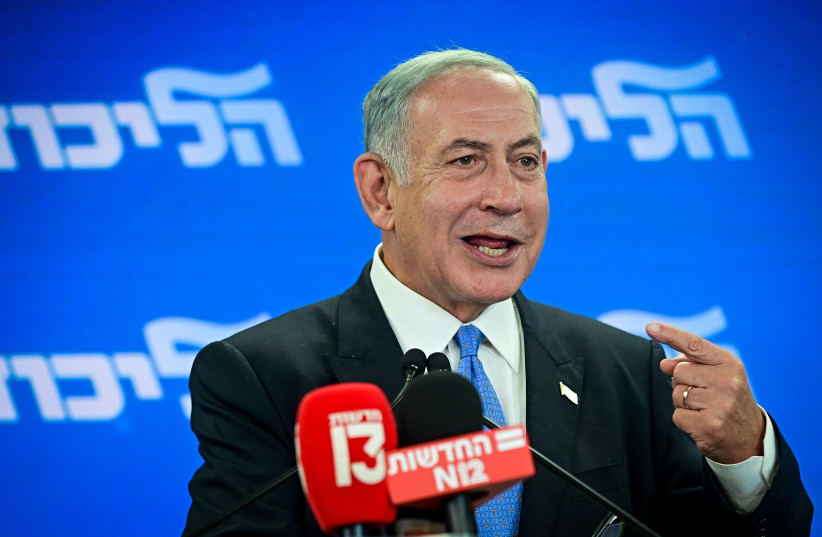It took US President Joe Biden six days in November to call Benjamin Netanyahu and congratulate him on his November 1 election victory.
This delay predictably led to speculation that tension would plague the US-Israel relationship under a Netanyahu government, and that this delay was a sign of Washington’s displeasure with the election results. After all, Fox News reported, it took Biden only a day to place a congratulatory call to Brazil’s Luiz Inácio Lula da Silva when he unseated President Jair Bolsonaro in elections there on October 30.
“Biden yet to call Netanyahu after election win,” ran the headline to a Fox News story featured on its website on November 5.
A day later, Israel Hayom had this headline to a story on its website: “Why have senior US officials yet to congratulate Netanyahu on election victory?”
On November 7, Biden placed the call.

Is the US-Israel relationship strong under Netanyahu?
Israel-US watchers always measure with a stopwatch the time it takes for the first phone call between new leaders of the two countries, or how long it takes to set up their first face-to-face meeting. This is seen as a harbinger of things to come. If the call and visit happen quickly, all is good; if the call or visit is delayed by weeks or months, then there must be trouble in the relationship.
By the same token, it is telling to see how quickly and intensively a new US administration engages with a new Israeli government, with conventional wisdom holding that the earlier and greater the engagement, the healthier and more robust the ties.
Were that indeed the gauge for measuring the current health of the US-Israeli relationship, then one would have to conclude that the relationship is very healthy and robust after the first month of Netanyahu’s new government.
Why? Because US Secretary of State Antony Blinken’s scheduled visit to Israel on Monday is the third visit from a senior US official in the first month of the new government’s tenure. US National Security Council head Jake Sulivan came to Israel for talks two weeks ago, and CIA head William Burns was reportedly here last week.
And that is to say nothing of the largest military exercise ever held between the two countries that took place over a period of four days last week.
Despite the most intense engagement the US has had with a new Israeli government in recent memory, few are those who would say on the eve of Blinken’s visit that Israel-US relations are at a high point.
Upsurge in Palestinian violence spars ahead of a major US visit
Instead, Blinken’s visit comes amid an upsurge in violence with the Palestinians, a dead-end as far as any diplomatic process with the Palestinians is concerned, and a hard-right wing government in Jerusalem that on Sunday announced in vague terms that it would “strengthen settlements” in Judea and Samaria.
The intense level of US-Israel engagement should be kept in mind when Blinken reaffirms – which he surely will during his visit to Jerusalem and Ramallah – Washington’s commitment to a two-state solution; its opposition to unilateral steps, such as expanded settlement construction; and its hope that the new government will remain true to the democratic principles enshrined in the Declaration of the Establishment of the State of Israel, known as the Declaration of Independence.

Some will see those comments as a sign of tension between the two states. But disagreement over those issues is only one part of a multifaceted relationship where there is, as last week’s major military exercise demonstrated, tremendous cooperation.
The exercise – which included the USS George H.W. Bush aircraft carrier and some 1,100 Israeli military personnel training with about 6,500 US counterparts - highlighted the close strategic alliance between the two countries. That should be kept in mind as differences regarding the Palestinians and wariness in Washington of some of Netanyahu’s coalition partners come to the fore during the Blinken visit.
But do not expect, as some are warning and others hoping to see, Blinken publicly taking the new Netanyahu government to the carpet or stating publicly that ties with the US will be irreparably harmed if the government adopts “illiberal” policies. Though Blinken may make such warnings quietly, it is simply not the style of this administration to engage in megaphone diplomacy with Jerusalem.
Unlike when Barack Obama was president, Biden’s preferred modus operandi is to deal with disagreements behind closed doors, not in front of journalists, some of whom are looking for any sign of a strain in the relationship.
The violence of recent days has undoubtedly shifted the priority of the issues that will be on the agenda when Blinken meets Netanyahu on Monday.
While Netanyahu would have much preferred the talks to focus on Iran and its regional proxies, as well as how to expand the Abraham Accords to include Saudi Arabia, the situation in east Jerusalem and the West Bank has undoubtedly altered the agenda.
This is yet another instance where as much as Israel would like to focus on issues other than the Palestinians with international interlocutors, including the US, the Palestinian issue always manages to intrude.
It will be interesting to note what Blinken says publicly – or even what is leaked about what he says in private – about settlement expansion, the situation on the Temple Mount and even judicial reform.
If he criticizes the government’s policies on any of these issues, Netanyahu could paradoxically take advantage of that criticism to get his coalition partners to tone down their policies.
For instance, if Blinken signals that the US would not block the censure of Israel in the UN Security Council over settlements if it makes a blanket decision to legalize settlement outposts or to begin construction in E-1, then he could use those threats to try and get the Religious Zionist Party or Otzma Yehudit to drop those plans.
Likewise, he could use warnings by Blinken of damage to support for Israel in Congress if it goes ahead with the sweeping judicial reforms as is, to get Justice Minister Yariv Levin and others to soften that reform.
Some may see signals of US displeasure over certain government moves that are sure to come up during Blinken’s visit as a sign of tension between Jerusalem and Washington. But Netanyahu, who is in the uncomfortable position of being the Left flank of his own government, may want to use that displeasure to get his coalition partners to walk back some of what he feels may be extreme and counterproductive demands.
